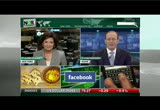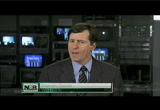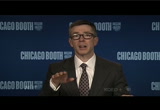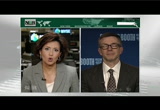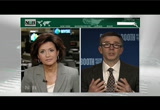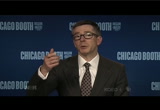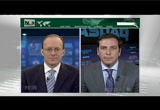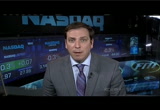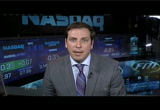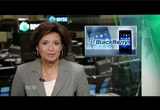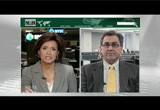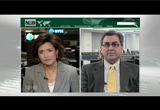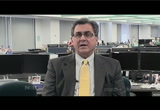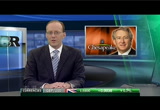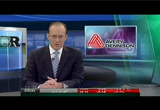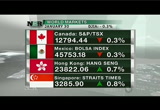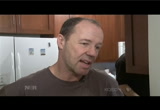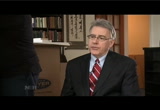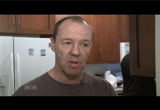tv Nightly Business Report PBS January 30, 2013 6:30pm-7:00pm PST
6:30 pm
captioning sponsored by wpbt >> this is n.b.r. >> susie: good evening everyone. i'm susie gharib. the economy is barely growing, so the federal reserve says it will keep buying bonds to stimulate growth, and create more jobs. >> tom: i'm tom hudson. facebook's latest earnings beat the street, but while the company saw big gains in mobile ad sales, it's costs also shot up. >> susie: and rim, rolls out the new blackberry 10, a new name, and a new ticker symbol, we look at what's riding on all those bold moves. >> tom: that and more tonight on "n.b.r."! >> susie: the federal reserve said the economy "paused" in recent months, so it's keeping its key interest rate near zero. the decision from policymakers
6:31 pm
today came on a day of mixed reports about the u.s. economy. on the jobs front, a strong payrolls report showed private employers added 192,000 jobs in january, much more than economists expected. but the commerce department said economic growth, contracted in the last three months of 2012. the g.d.p. shrank by 0.1% the first time that's happened since the financial crisis began. the fed said in its policy statement today that it continues to see "downside risks" to the economy. unemployment is still "elevated". but household and business spending advanced. >> susie: darren gersh begins our coverage with that weak reading on the economy. >> reporter: last quarter, defense spending fell off the fiscal cliff. as lawmakers bickered, manufacturers who make things for the pentagon cut back production sharply-- defense spending fell 22% in the latest g.d.p. report, tipping the economy into the red.
6:32 pm
>> certainly manufacturers are pulling back and i think this is a bit of a wake up call that these cuts are real and that they have real effects on the economy. >> reporter: economists and markets did not panic over the drop into the red, because the economy is still showing signs of solid growth. businesses are still buying equipment and software. housing continues to bounce back. and consumer spending held up well, expanding at an annual rate of 2.2%. >> so if you look through some of the volatile components, demand underneath was solid and it doesn't suggest the economy is losing momentum. so a scary headline number isn't as bad as it seems when you look underneath. >> reporter: and that's what economists say federal reserve policy makers did. after studying the economy for two days, chairman ben bernanke and his colleagues issued what most called a "no news" statement. the fed says it will keep interest rates near zero and plans to keep buying bonds in order to keep interest rates low. today's g.d.p. report didn't change that plan.
6:33 pm
>> what the fed is trying to do is generate stronger labor market growth and labor market performance and we don't really have any data on that yet. so we don't have the employment report yet, so we think it is just status quo for the fed at this time. >> reporter: well, almost status quo. the fed continues to watch congress closely for clues about whether deep, automatic federal spending cuts will take effect in a month or congress will decide to close down parts of the government as republicans and democrats battle over the budget. >> i think the fed is very conscious of the fact that fiscal policy which had been providing stimulus earlier in the recovery had really now turned to a strongly contractionary phase and so, when the fed thinks about what it needs to do, it views that as part of the backdrop for its need to continue to be accommodative. >> reporter: most analysts expect the economy will bounce back and remain positive for the rest of the year. of course, that assumes policy makers in washington don't take the economy over another cliff. darren gersh, "n.b.r.," washington.
6:34 pm
>> susie: for more analysis, we're happy to have with us, randall kroszner, former fed governor, and now professor of economics at the university of chicago booth school of business. >> susie: nice to see you, randy. so, this was a status quo announcement from the fed today, but as you look at all of today's economic news, how is the economy really doing? should we be starting to get a little worried about how things are going? >> well, i think the underlying economy seems to be doing reasonably -- not great. it is not falling off the cliff, and it is not going gang busters. but consumers are consuming, and businesses are investing in software. we had some one-off things, and we had such a decline in defense spending. and when you smooth it out over two, it was not really that much of a change for defense spending. and we were growing at about 2% on average, which
6:35 pm
is roughly where we have been, this kind of long sideways slide that the economy has been in for the last year or two years. >> susie: but, you know, when that g.d.p. announcement came out this morning, and as that one economist said in darren's report, that that's a scary headline, a lot of people were saying, this is going to be a down day in the markets. and that didn't happen. is it we're just kind of getting satisfied with the idea that the u.s. economy is going to be weak pretty much from here on, what some people call the new normal. >> i think people saw through the headline number to see the underlying strength in consumption and housing and business investment in equipment and software. but i think people are expecting that the economy is going to do okay but not great. >> susie: all right, so what happens next? how long does this so-called qe-3 going to last? what is it going to take
6:36 pm
for chairman bernanke to let up a little. >> i think the economy is going to recover but i think it will be a long time before they take the punch bowl away from the party. i think they'll make these purchase, about $85 million a month, and it will go to $3.5 trillion to even $4 trillion. until we see inflation kick up, and we see no evidence of that, and we see the unemployment rate come down to 6%, and that's probably a long way off, the defense is probably not going to move. >> susie: and we have this whole budget impasse. if we get some major dramatic government spending cuts, as of, let's say, march 1st, when that mechanism kicks in, the fed will have to take that into account. >> well, there is only so much that the fed can do. they say they can provide
6:37 pm
the necessary conditions for recovery, making sure that credit is flowing, and the banking system is operateing. but it is not sufficient if there is all of this fiscal uncertainty and fiscal shenanigans that are going on. it will make people pull back from investing, and there is only so much the fed can do. >> susie: we have this big jobs report that is coming out on friday. i'm wondering what you're expecting? do you think we're going to have a robust number, something that encourages that businesses are stepping up their hiring? >> i think we'll continue to see what we've been seeing, reasonable private sector job growth. not enormous, but it is reasonable. it is gradually having the unemployment rate move down. the real challenge and the interesting thing to look at is there are so many discouraged workers that they just leave the labor force. sometimes the unemployment rate goes down because there are fewer people looking for work. that is not a good sign.
6:38 pm
so that's really the key thing to focus on. >> susie: we will be focusing on all of that when it comes out on friday. thank you so much, randy. interesting conversation. and we've been speaking with randall kroszner, a former fed governor and now professor at the university of chicago booth school of business. >> reporter: i'm erika miller in new york. still ahead, the northeast is leading the nation in number of workers leaving for other regions. we'll look at what that is and what it means for the national economy. >> tom: concerns about what the federal reserve would say combined with worries about that surprisingly low reading on g.d.p., to hold stocks back today. the dow fell 44 points, the nasdaq lost 11 and the s&p closed down nearly six points. with it's newest plane grounded, boeing says its financial outlook for this year sees no significant impact from the 787 dreamliner's problems. but as the plane maker reported fourth quarter earnings today, it also acknowledged that assessment could quickly change.
6:39 pm
earnings were down considerably from last year thanks to a tax settlement a year ago. but the results were well above wall street estimates, thanks to a double digit jump in revenues. driving that growth was an increase in deliveries of commercial planes. the 737 remains the driver, with 105 planes delivered. the 777 also helped, as did the 23 dreamliners handed to customers last quarter, but those planes can't fly right now. u.s. and japanese regulators have grounded the 787 due to concerns about its lithium batteries overheating and catching fire. today boeing management said it is making good progress in finding the cause. peter arment is the aerospace analyst at investment firm sterne agee. >> tom: boeing still plans to ramp up production of that dreamliner, triple the number it delivers and takes payment for. how confident are you it can stick with that? >> we're very confident. i mean, yes, there is no question there is headline risk with the 787. i think that there is concerns about what the
6:40 pm
ultimate solution will be, or root cause. but everything we have seen, it is a battery defect. this plane has had over a million flight hours in terms of testing those batteries in the labs. and that it would exceed in its life. we think ultimately that's what is going to be the end result, and boeing will get back to delivering the aircraft in the second quarter. >> tom: let's look at the backlog that boeing has had. it is a record backlog. 85% comes from commercial airlines, 15% from the military and space division. a lot is riding not only on the 787, but the 737, isn't it? >> it is a big driver of profitability for the company. it is definitely their most profitable platform. they have a tremendous amount in backlog. they have close to 2500 in backlog for that particular program. it is ramping up to record levels through 2014. >> tom: that's the 737.
6:41 pm
how vulnerable is that 787 delivery if it takes longer than the best case scenario. >> we're assuming there are no deliveries in the first quarter. it will take some time for the execution. but for the 60 they outlined for this year, they commence deliveries in the second quarter. and they will probably exceed that, assuming that the solution they come up with doesn't require any major modifications. >> tom: delivery is important for boeing because that's when it can begin to accept some of the big payments that the air carriers pay for those. let's look at shares of boeing, peter. the stock price obviously seeing a lot of vulnerability, as well a volatility since announcing the problem with the lithium batteries. 74 and change, what do you expect that to be at? >> it has felt a little snake-bitten with the volatility, and it has underperformed the broader market, but we think there is a significant upside as they start to deploy a lot of that cash for stock
6:42 pm
buybacks. we have an $87 price target, and there could be an up side if they get aggressive with buying back more shares. >> tom: and it has a lot of free cash flow at its access. do you own any shares of boeing yourself, peter? >> no. we're prohibited from doing that. >> tom: peter arment, analyst at sterne agee tonight. alcoholic >> susie: it was all about blackberry today in the technology world. rim unveiled its long-awaited new operating system, known as blackberry 10. the platform will run two new phones: the z10 and q10.
6:43 pm
but, there will be some delay before american users can get their hands on either of the devices. suzanne pratt reports that blackberry 10 is too little, too late. >> reporter: this is rim's hope for the future. complete with a 4.2 inch screen, the sleek, elegant new smartphone runs on a new operating system, known as blackberry 10. the so-called z-10 phone has a touch screen, while the q10 has blackberry's traditional physical keyboard. and, if you wondering how important they are to rim, consider a separate announcement its c.e.o. made today: >> from this point forward, rim becomes blackberry. it is one brand, its one promise. >> reporter: the one promise that blackberry fell short on was timing. the z10 will not be available in the u.s. until mid-march, the q10 will launch globally in april.
6:44 pm
those delays disappointed investors. >> there's a short window of opportunity. remember samsung is getting ready for its brand new launch of its new samsung galaxy s4. apple is actually bringing the launch of next iphone 5s. so, the sooner they get it out the better. >> reporter: once out, they will be available on all major u.s. carriers, and it looks like the subsidized price will range from $149 to $199. still, will people beyond diehard blackberry fans actually buy the phones? >> start with suzanne's question i was a long time blackberry user. about a year ago, i finally switched. why should i switch back? >> you know the famous home button on the bottom of the device, you don't need this anymore. you don't go in and out of applications. you have it all at your fingertips at the same time. and you can take action on it without opening any other applications.
6:45 pm
>> reporter: but, if you're worried that blackberry isn't hip enough for you, the company had one more surprise: a new addition to its payroll. our new global creative director, ms. alicia keys. >> they did a very nice job. they brought the product out in a successful manner. now the issue is will it sell or is this going to be the phone that people say nice things about it, but don't purchase it. >> reporter: it will be many months before we know whether blackberry 10 is a financial home run. already, however, with this massive media event, the company has succeeded on one front. people are talking about blackberry again. suzanne pratt, "n.b.r.," new york. >> susie: also from the tech sector, solid earnings and revenues from facebook. but despite the strong numbers that came out after the market close, facebook shares tumbled as much as 5% in after hours, then rebounded slightly. facebook earned $0.17 a share in the fourth quarter, $0.02 more than analyst estimates. revenues also came in better than expected: up 41% to $1.59
6:46 pm
billion, thanks to stronger ad sales on cell phones. >> susie: joining us with more analysis on those facebook numbers, michael pachter, research analyst at wedbush securities. >> susie: so, michael, you've had time now to analyze the numbers, you listened in on the conference call. what's your take on facebook, how it's doing and the outlook? >> they did everything right except they continued to plan to spend a lot of money. and i think that investors have bid up the share price in recent weeks because they expected that the rate of spending growth would slow, and that you would start to see some leverage from the revenue growth. and it doesn't look like we're going to get very much of that next year. >> susie: a lot of people were saying ahead of this earnings report coming up that the one number to watch was the percentage of ad sales coming on mobile phones. and facebook delivered a really strong number. 23%. so that wasn't enough to
6:47 pm
offset any other disappointments? >> no. that number is huge. if you think about mobile users comprising about 62% or 63% of total users, you know that is not exclusive use. so overall mobile use is probably closer to 30% of total. so it means that mobile is catching up. but if they keep spending money, when are they going to make that elusive $2 that justifies a $50 or $60 share price. >> susie: we've got to talk about the stock, for all of the things going on. you're very bullish on facebook stock, i know that. even though it has been moving up recently, it is still trading below its i.p.o. price of $38 a share. make a case of why investors should buy facebook at $29? >> i think it is pretty simple if you take a look
6:48 pm
at the slides. you can look at the monitorization per uses, they're doing north of $10, something like $13 a year for u.s. and canadian users, they're doing something like 1.80 for asian and outside of europe. there is room for probably that to come up, rest of world, $4 or $5, and u.s. to $20, and then you're talking about serious money. then they're probably doing something about $15 billion a year in revenue. if they are doing $15 billion a year in revenue, they're making a ton of money. you look at the base and figure they're going to monetize that eventually. >> susie: putting all that aside, do investors have issues with mark zuckerberg as c.e.o.? is he sending out the right message? >> ith h i think he did a master job. but the only bone is he still believes in building
6:49 pm
the business and spending money to do so. we're going to have to see if that pays off, but i think it will. >> susie: michael, any disclosures, do you own facebook? >> i don't own facebook or boeing. thanks for asking, susie. >> susie: good to know that. michael pachter of webbush security. >> tom: the disappointing read on the fourth quarter economy didn't hurt stock prices but the major indices sank after the federal reserve offered its mixed assessment of the economy. the s&p 500 initially shrugged off the weak g.d.p. data. but by the time the federal reserve announcement was
6:50 pm
released, prices were headed lower, ending down 0.4%. trading volume held steady from yesterday. 704 million shares traded on the new york stock exchange. just over two billion moved on the on the nasdaq. nine of the 10 major sectors were weaker, led by losses in the industrial, energy and materials sectors. amazon shares were in focus after last night's quarterly results included higher gross profit margins, encouraging it's investors. shares gained 4.8% as volume quadrupled. even though its earnings and outlook were weaker than expected several analysts increased their price targets for the stock, expecting profit margins to continue to improve. after hanging on through controversies over heavy spending and his personal business, chesapeake energy c.e.o. aubrey mcclendon will step down. on april first he will leave the executive office of the energy company he founded in 1989. the scrutiny of mcclendon picked up last year over a potential conflict of interest.
6:51 pm
he borrowed money to pay for his personal stake in chesapeake energy wells. some of those loans reportedly came from parties that also were doing business with chesapeake. in addition, the company has about $16 billion in debt, which it has pledged to almost cut in half. shares jumped 6% on the news of mcclendon's exit, rising to their highest price since november. volume was more than five times average. chesapeake is the second largest natural gas producer in the united states after exxon mobil. a deal in the natural gas business is focused on pipelines. kinder morgan energy partners will buy copano energy for $3.2 billion. it values copano at $40.91 per share. shares of the buyer, kinder morgan, fell 2.3%. while copano gained 14.8%. copano has nine processing plants and 6,900 miles of pipelines. a smaller deal in the office products industry. avery dennision is selling two business for $500 million to c.c.l. industries of canada. shares of a.v.y. rallied 6.4% to
6:52 pm
a new 52 week high. it also helped the company reported a much stronger than expected fourth quarter profit. a couple of employment firms were rallying today, on the back of earnings. manpower gained 6.7%, closing at a new 52 week high. earnings slowed from last year, but were stronger than expected. robert half international rose 6.6%, also at a new 52 week high, as earnings growth was better than forecast. four of the five most actively traded exchange traded funds were lower. the short term s&p 500 volatility note gained more than 6%. it usually moves in the opposite direction of the broader market. and that's tonight's "market focus."
6:53 pm
>> susie: americans are on the move, and part of the reason is jobs. more and more people are moving to new places in search of better employment opportunities, because of the weak economy. the number of people moving to new homes in the u.s. has finally come back to pre- recession levels. erika miller takes a closer look at where workers are going, and why. >> reporter: it's moving day for christopher english. the u.n. worker is retiring from his job in new york, and moving to northern ireland. >> i'll continue to work. i'm a translator. and there's always demand for translation work. so, i'll be dusting down my dictionaries after taking a couple month's break. >> reporter: he's part of a growing number of people who are leaving the u.s. for europe. the u.k. is second only to germany as a top international
6:54 pm
destination u.s. workers. australia, china and switzerland round out the top five. >> the u.k. and germany are strong economies-- the 5th and 7th largest economies in the world-- and they continue to be very significant trading partners, even though their growth rates are stagnant. >> reporter: people move for many reasons-- not just a new job. it could be marriage, or a desire for a warmer climate. but there's no denying migration patterns tell a lot about regional economic differences. so where are workers moving to in the u.s.? >> washington d.c. has been the top destination for several years now. i think that's a reflection of the growth of not only governmental activity in washington, but it's defense contractors, and folks who are there to protect the interests of their company. >> reporter: oregon, nevada, north carolina, and south carolina are also popular places to move. on the other hand, states like
6:55 pm
new jersey, illinois, west virginia, new york, and new mexico had an exodus of workers. many of those departures are rooted in lack of jobs, high taxes, and expensive housing. economists are pleased to see a pick-up in moving, because it reflects greater job opportunities, and improvement in the housing market. >> labor mobility, job growth and housing activity will all feed on each other. and so, we are beginning to see the start of that cycle now. as we progress throughout this year and into next, we will see that cycle begin to accelerate. and if you happen to be one of the millions of people planning to move this year, christopher english has a tip. >> it really, really helps to go around a reorganize your life around your stuff before the packers come. you find it's a great opportunity to get rid of a lot of stuff. >> reporter: a positive start to a new chapter in your life, and a positive sign for the economy.
6:56 pm
erika miller, "n.b.r.," new york. >> tom: tomorrow on "n.b.r." >> susie: that's "nightly business report" for wednesday, january 30. have a great evening everyone, and you too tom. >> tom: goodnight susie, we'll see you online at: www.nbr.com and back here tomorrow night. captioning sponsored by wpbt captioned by media access group at wgbh access.wgbh.org
115 Views
Uploaded by TV Archive on

 Live Music Archive
Live Music Archive Librivox Free Audio
Librivox Free Audio Metropolitan Museum
Metropolitan Museum Cleveland Museum of Art
Cleveland Museum of Art Internet Arcade
Internet Arcade Console Living Room
Console Living Room Books to Borrow
Books to Borrow Open Library
Open Library TV News
TV News Understanding 9/11
Understanding 9/11
